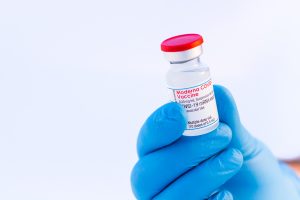
Moderna has another COVID-19 vaccine in its clinical pipeline, which if successful will potentially make distribution and administration easier.
The firm already has an mRNA cell-free COVID-19 vaccine, 1273, approved under FDA emergency authorization. However, it is developing an additional COVID-19 vaccine candidate coded 1283, which it believes will be easier to allocate and administrate due to it potentially being refrigerator stable.
According to the firm, the next generation COVID-19 vaccine candidate is made from portions of the spike protein, which is crucial for neutralization, the end terminal domain, and the receptor binding domain.

Image/iStock: carmengabriela
The main advantage that mRNA-1283 could have over mRNA-1273 is its potential to be refrigerator stable. The approved vaccine mRNA-1273 must be stored at -20C, which can be achieved using a conventional freezer.
“The key point here is that while our current product requires refrigeration to minus 20C, which is not a terribly unusual level of refrigeration and in fact the supply networks around the globe are typically equipped to handle that level of refrigeration, obviously, to the extent it could be in a non-frozen state,” said Moderna’s chief financial officer David Meline at the 20th Annual Needham Health Conference last week. He continued: “that would be an even better offering to facilitate distribution and administration.”
Phase I
The company announced in March that it began its Phase I study of mRNA-1283 and participants have received their first dose of the vaccine candidate.
“We are pleased to begin this Phase I study of our next generation COVID-19 vaccine candidate, mRNA-1283,” said
“Our investments in our mRNA platform have enabled us to develop this next generation vaccine candidate, which is a potential refrigerator-stable vaccine that could facilitate easier distribution and administration in a wider range of settings, including potentially for developing countries. We remain committed to helping address this ongoing public health emergency.”
The results from Phase I are expected to be available soon with Meline stating “what we then expect is that indeed, assuming success with the 1283, it would be replacing the original 1273 vaccine [once] we get approval for that.”
While it has not been disclosed what would happen with 1273, mRNA-1283 is expected to be evaluated in further studies for use a booster dose for previously vaccinated individuals.
About the Author
You May Also Like






